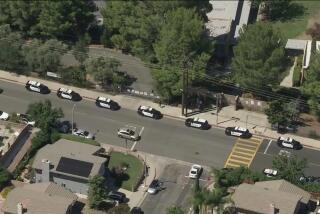When the Campus Bully Runs With the ‘In’ Crowd
- Share via
It would be nice if they were easy to spot, if they stomped around campus snatching backpacks and spitting on classmates, stuffing boys into trash cans, shoving girls into lockers. If we could only round them up and herd them into detention, then haul their parents in for counseling, maybe we could isolate the menace of bullies in our midst.
But in real life, it is not that easy. Because the bully is not always the classic tough guy, wreaking havoc on smaller, weaker kids.
“That’s what we tend to think of--the social outcast, the highly aggressive kid who’ll basically intimidate anyone in his path,” says psychologist Fred Frankel.
The campus bully is just as likely to be the honor student, the football player, the standout on the girls’ volleyball team, and the bullying is just as likely to be physical.
“The kids who get away with bullying tend to be the ‘nicer,’ more popular kids, and they get away with it because they’re liked,” says Frankel, a professor of medical psychology at UCLA. “They engineer it so they pick on a kid who has no friends, no supporters, in areas like the bathrooms or to and from school, where they are not likely to be seen by adults.”
Frankel runs UCLA’s Parent Training and Children’s Social Skills Program and has written a book called “Good Friends Are Hard to Find” (Perspective Publishing, 1996). He has counseled hundreds of families whose children are on the road to becoming either victims or bullies. “Bullies exist because we let them get away with it, and we have for ages,” in part because the competitive nature of our culture--and our campuses--discourages intimacy and encourages domination, he says.
“The school climate encourages competition--for the best grades, the most attention from the teacher. And competition and intimacy are opposites. Getting to care about people is just not compatible with competition.”
*
I tell Frankel about the hundreds of letters, phone calls and e-mails I’ve received since I began writing about bullying as a possible factor in the school shootings in Santee. Among the messages are angst-ridden accounts of parents whose children are being bullied, and long-buried memories of adults whose torment is ancient history. He is not surprised.
“There’s a nerve that’s been touched here,” he says. “The people who’ve endured the bullying, they’ve never been able to speak about it. They finally have an outlet to say, ‘Hey, this is what happened to me.’ ”
The typical victim doesn’t tell, he says, “because it’s humiliating. You feel ashamed. You’re not going to share it with your parents. They ask questions, you deny it.”
At school, teachers often miss the signs that someone is being victimized. And children who muster the courage to tell are sometimes punished, in effect, by being forced to confront their victimizers or, worse, disbelieved.
“These [bullies] can be reasonably popular and liked by the teachers, who are not apt to believe that they could do such horrible things,” Frankel says. “You have a kid who’s kind of an outcast, not well-liked, complaining about a kid who seems so nice. Which kid do you believe?”
*
If your child won’t confide, what’s a parent to do?
Ann--a former teacher and Huntington Beach mother of two--heard from a lunchroom monitor that her daughter was being bullied at lunch by a classmate at her middle school. So she began visiting the campus every day around noon. “I know kids find this a total embarrassment,” she said. “My daughter was mad at me at the time. But I told her I’m not going to put up with this sort of orchestrated cruelty.”
She kept a tally of every incident she witnessed--involving not just her daughter, but any child--and took it to the administration. “They did nothing at first,” she said. “But I made it clear I was going to make a real pain of myself until something changes.” Ultimately, the school enlisted teachers and parents to monitor the halls, lunch area and restrooms. The atmosphere at the school is now noticeably different, she said.
“You could sense the relief not just among the kids who were picked on, but among the kids who were doing the bullying,” she said. “A lot of these kids just want so badly to belong, they exercise their power over other kids to reassure themselves, to solidify their place. I think some of them are really looking for adults to give them limits, to say, ‘Hey, cut that crap out.’ And instead we pass the buck.”
Parents are sometimes reluctant to intervene because they don’t want to embarrass their children. But Frankel says we should never leave a child “to fend for himself. We’d call it stalking if these were adults. But with kids, we just sort of look the other way.”
The parents of bullies need a wake-up call as well, he says. “Some parents are afraid their kids will be considered wimps if they break up the [bullying] group. I tell them studies show there’s a 21% chance the campus bully will have a criminal record as an adult. Do you really want to take that chance?”
More to Read
Sign up for Essential California
The most important California stories and recommendations in your inbox every morning.
You may occasionally receive promotional content from the Los Angeles Times.










